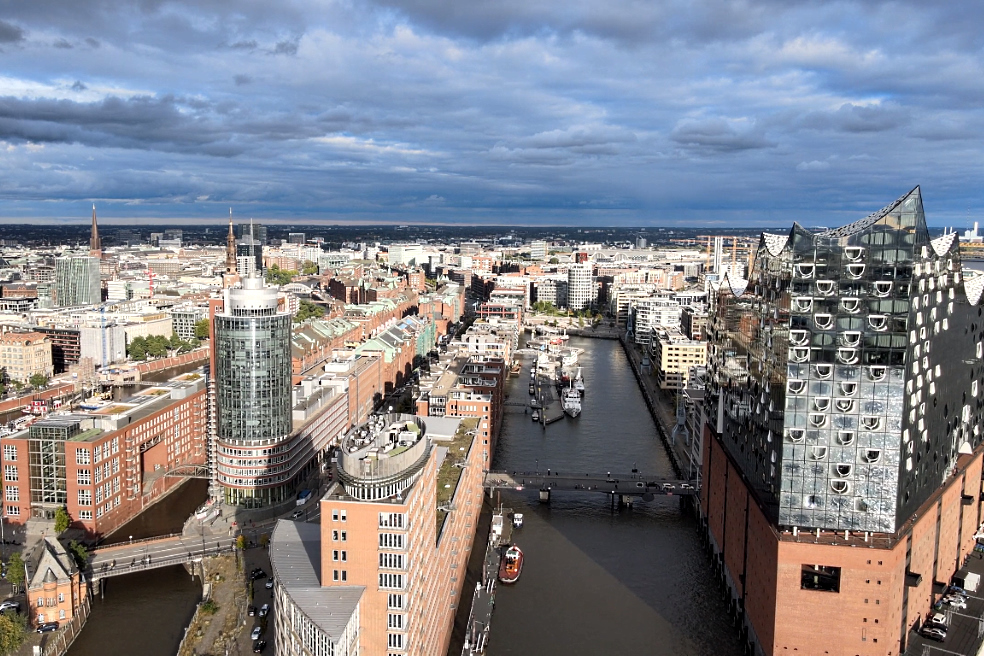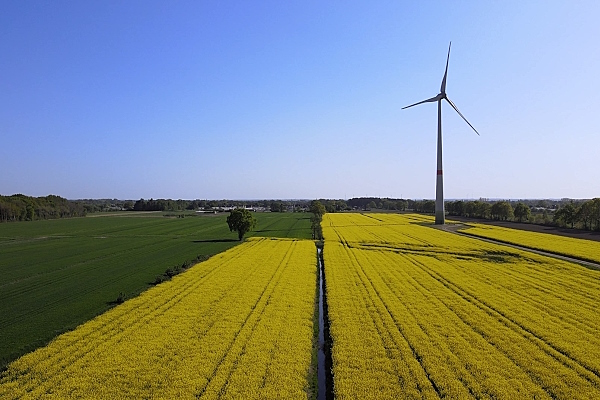After receiving the necessary documents (application form and project presentation), our team will try to review your request as soon as possible, and leading experts will offer the best options for project funding.
The total volume of large business lending in Germany is estimated at hundreds of billions of euros every year, a large part of which goes to leading banks such as Deutsche Bank, DZ Bank, Commerzbank, UniCredit Bank AG and others.
Long-term funding for early-stage projects is vital to put a new business idea on a solid foundation.
ESFC Investment Group, a European company with rich international experience, offers project finance, large business loans, land loans and industrial loans in Germany, as well as provides loan guarantees, supporting its clients at all stages of the implementation of investment projects.
Large business loans in Germany: history, current situation and prospects
Germany is a country with a long and strong tradition of business lending.The spread of the credit system began in the late Middle Ages. Large German lenders influenced politics by providing loans.
When the church ban on interest was abolished in the 16th century, the lending in Germany has truly blossomed. All citizens could take loans, since the debtor's real estate was usually used as collateral.
To make it easier to issue mortgage loans, debts and ownership of property began to be registered in land registers from the 18th century. Since the entry into force of the German Civil Code in 1900, a single credit law has been in effect throughout Germany.
Since that time, the German banking system has gone through a long path of evolution, assimilating the best global models of business financing and strengthening them with its own principles and traditions. Nowadays, business loans play an important role in financing large projects, in particular projects based on project finance schemes.
This category includes land loans for developers, industrial loans and other forms of business financing that are widely used in Germany and other European countries to ensure sustainable economic development.
German business needs more debt capital
As pandemic restrictions in Germany were largely lifted, private consumption received a significant boost in early 2022.On the other hand, energy prices, which have risen sharply since the start of the war in Ukraine, are fueling inflation and reducing the purchasing power of German households. Supply bottlenecks are slowing production, and exports are also suffering from weak demand.
Against this background, the economic forecasts for the current year have been revised downwards, in some cases sharply. From today's perspective, GDP growth in Germany can only be expected to be between 1.5% and 2.3%. According to the estimate, the inflation rate in Germany rose to 7.9% in May 2022, the highest level in more than 48 years.
The Ifo business climate indicator fell to 88.5 points in August 2022, showing negative expectations of rising fuel and electricity prices, falling demand and a general slowdown in the German economy.
In the second quarter of 2022, higher costs and greater economic uncertainty led to the largest growth in business loans, including industrial loans, ever recorded in Germany. This figure reached +35 billion euros in absolute terms, corresponding to a growth of 2.3%. According to Deutsche Bank, the total volume of lending exceeds the level of the previous year by 7.6%. Experts call the growing need of industry for short-term loans the main driver of lending. At the same time, the volume of deposits (+3.8%) grew much more slowly than loans.
Against this background, large German business showed a keen interest in issuing bonds and other financing alternatives, which were quite weak before.
In the 2nd quarter of 2022, another 4.8 billion euros worth of bonds were issued in Germany, excluding corporate bonds.
However, due to numerous crisis phenomena, experts note signs of cooling of the market.
The nearest prospects for the economy are uncertain
German business in 2022-2024 expects an exhausting struggle with logistical problems, high gas prices and rising inflation.In an unfavorable scenario from Deutsche Bank, which includes the cessation of supplies of Russian energy resources, there would be a noticeable decline in economic activity.
Despite this, experts expect weak growth from the first half of 2023. Energy commodity prices are falling somewhat, logistics chains are gradually recovering, external demand is rising, and private consumption within Germany is being supported by savings accumulated by households during the pandemic.
Additional spending on defense provides a boost to the economy.
The labor market will continue to grow. Wages are rising, but high inflation is partially canceling the progress.
Under these conditions, the German economy will grow by around 2.5% in 2023 and by almost 2% in 2024. This growth will be fueled by industry, including through industrial loans. Short-term debt capital needs are growing, while long-term investment projects remain in question.
In general, the prospects for German business in the coming years remain uncertain, as unpredictable and disruptive events in Eastern Europe can significantly change the situation at any moment, including the worst-case scenarios of a nuclear attack and another influx of refugees, both from Ukraine and from Russia and neighboring countries.
Role of business loans in the banking system of Germany
Unlike many other countries, Germany regulates lending very strictly, requiring a banking license under the German Banking Act (KWG).Not only the issuance of a new business loan, but also the restructuring of a loan received from another creditor can be qualified as a lending that requires an appropriate banking license.
As for medium- and long-term business loans in Germany, in 2021 this market was dominated by large banks, regional banks and cooperative banks, as well as savings banks (Sparkassen), which accumulate huge resources, including for financing entrepreneurs.
Germany's banking system is based on the principle of universal banking, which includes but is not limited to services such as the control of financial activities, lending to individuals and the issue of business loans, industrial loans, land loans, mortgage loans, as well as the investment field, which is not limited to the purchase or sale of investment capital.
Germany's dual banking system includes credit organizations and the European Central Bank (Europäisce Zentralbank or EZB), which works closely with the Deutsche Bundesbank and its branches.
This system, which is regulated by the EU, this system includes credit institutions and organizations specializing in financial services.
Germany has a very long history of banking that dates back many centuries. The German Banking Act defines about a dozen different types of credit institutions. Formally, these are enterprises that conduct banking activities on a commercial basis.
The main types of banks in Germany are as follows:
• Private banks or commercial banks.
• Savings banks and credit institutions.
• Cooperative banks.
Banks, the types of which are described above, carry out banking operations for individuals and corporate clients at the national and international levels, in particular the issuance of business loans in Germany and abroad.
The difference between these types lies in the organizational structure, rules and instructions that are complementary to the basic regulations defined in the KWG.
Traditional banking operations (deposit and credit banking operations) are carried out by the vast majority of financial institutions. Banks that have permission to carry out such operations are called licensed banks (Vollbank). Licensed banks are required to have a special organizational structure, which must be in accordance with Sections 32, 33 of the KWG.
Its minimum authorized capital must be no less than EUR 5 million (Section 33, Subsection 1, Item 1 KWG).
Banks or credit institutions engaged in activities not specified in Section 1, Subsection 1, Item 1 of the German Banking Act (KWG) are considered special banks (Spezialbanken).

The government financial supervisory organization (BaFin) is a body that supervises the activities of banks. BaFin was founded on May 1, 2002 and currently combines three areas such as banking supervision, the insurance sector and securities trading. BaFin is an independent body controlled by state law and part of the German government.
Commercial banks in Germany
As of 2021, commercial banks in Germany covered about 5,800 businesses with a total workforce of 142,000 people.This multibillion-dollar market has been divided between several major financial institutions, such as Commerzbank AG, UniCredit Bank AG, ING-DiBa AG and others.
Commercial banks in Germany can be organizations with limited liability (GmbH or Gesellschft mit beschränkter Haftung), general partnerships (oHG or Offene Handelsgesellschaft), limited liability partnerships (GmbH & KG or Kommanditgesellschaft mit beschränkter Haftung) and corporations (AG or Aktiengesellschaft).
Shares in private banks are owned by individuals and companies, with all the benefits and risks of such a structure.
Commercial banks serve retail customers, issue business loans for replenishment of working capital, long-term industrial loans and other corporate banking products, but they traditionally place the greatest emphasis on international activities.
In particular, German commercial banks are actively involved in international project finance schemes, providing long-term capital for energy projects, mining projects, industrial enterprises, as well as agricultural businesses in the Middle East, Latin America, Southeast Asia, Africa and other regions of the world.
On the one hand, the main rules of private banks' activities concern mainly their corporate structure. These provisions are set out in the Handelsgesetzbuch (HGB), the Limited Liability Companies Act (Gesetz über Gesellschaften mit beschränkter Haftung or GmbHG) and the German Stock Corporation Act (Aktiengesetz or aktG).
On the other hand, commercial banks must act according to the rules and instructions for the management of banking operations, which are established but not limited to the Law on Banking Operations and the Law on Trading in Securities, as well as a large number of other acts, regulations, rules and instructions.
Private banks have their own rules and instructions called General Business Conditions (Allgemeine Geschäftsbedingungen der Geschäftsbanken).
Sparkassen-Finanzgruppe
Sparkassen-Finanzgruppe (SFG), founded in December 1975, is an association of savings banks throughout Germany with a common concept, financial policy and corporate design.SFG offers German companies and individuals a wide range of financial services, including business loans. In 2020, the total volume of loans issued through the SFG system amounted to 906 billion euros.
The association is organized by the German Savings Banks Association (DSGV) with offices in Berlin and Bonn. It represents the interests of the Sparkassen-Finanzgruppe at national and international levels and determines the strategy of the entire group.
DSGV is also the owner of all national and international collective brands of the Sparkassen-Finanzgruppe.
The activity of savings banks are set out in acts that are part of German banking legislation. They are regulated by the KWG, just like commercial banks. Savings banks are significantly limited in their way of investing funds. This is due to the fact that they are considered banking institutions to serve low-income people and therefore have certain restrictions regarding security (reliability).
In the past, these credit institutions were insured by the local authorities.
Sparkassen-Finanzgruppe has grown significantly since July 1994, when deregulation measures removed the federal states as sponsors of the public insurance system and replaced them with regional savings banks and associations as sponsors or shareholders. Insurance also remains a traditionally important part of SFG's portfolio.
Sparkassen-Finanzgruppe represents German savings banks and their subsidiaries and holdings as part of the three-pillar model of the German banking sector.
As of 2019, SFG included about 380 savings banks, 3 factoring companies, more than 50 venture capital companies, 8 state construction cooperatives, 2 leasing companies (such as Deutsche Leasing AG), several insurance companies, as well as a pension fund and a number of other financial institutions.
At the end of 2018, Sparkassen-Finanzgruppe had 520 companies with about 294,000 employees.
Cooperative banks
Joint stock banks operate under the Cooperative Act (Gnossenschaftsgesetz or GenG), which regulates the various types of companies.GenG regulates the activities of not only large credit institutions, but also the operations of different cooperative organizations.
The main purpose of the law is to enable small business owners to cooperate with other institutions. In this regard, joint-stock banks are regionally structured local banks (credit institutions) that focus mainly on local retail and small business customers.
There are also a number of other financial institutions in Germany that issue business loans, land loans and offer other financial instruments. All of them are regulated by specific legislation, but their rules and guidelines are aligned with the KWG, as well as with other rules and guidelines related to the licensing and management of the banking sector.
The number of credit institutions is several thousand, which gives corporate clients a wide choice of financial products and offers.
The largest banks for industrial and business loans in Germany
The German banking system offers an extremely wide selection of financial instruments and funding sources.This also applies to companies that need long-term capital to implement expensive projects in the field of heavy industry, renewable energy, mining and processing of minerals, environmental projects, infrastructure development, hotel business, residential construction and commercial real estate. But the leading role in issuing industrial loans and business lending in general is played by several large credit institutions that are known all over the world.
The list of largest German banks includes the following:
• Deutsche Bank AG.
• DZ Bank Group.
• KfW (Kreditanstalt für Wiederaufbau).
• Commerzbank AG.
• Unicredit Bank AG.
• Landesbank Baden-Württemberg.
• Bayerische Landesbank.
• J.P. Morgan AG.
• Landesbank Hessen-Thüringen Girozentrale.
• ING Holding Deutschland GmbH.
• DKB Deutsche Kreditbank AG.
• Norddeutsche Landesbank Girozentrale.
• NRW.Bank and others.
We offer a more detailed look at financial institutions that are involved in the financing of large businesses and investment projects in Germany and other countries of the world.
Deutsche Bank
Deutsche Bank AG is the largest financial institution in Germany, an international bank operating around the world.Headquartered in Frankfurt am Main, Deutsche Bank operates as a universal bank and has major branches in London, New York, Singapore, Hong Kong and Sydney. More than 84 thousand professionals work in its structures, and the network is spread over 58 countries. Deutsche Bank is among the top 30 largest banks in the world by total assets. The bank was founded in 1870.
The bank pays special attention to investment banking activities with the issuance of shares, bonds and certificates, as well as long-term industrial loans for financing large projects in Germany and other countries.
Under the DWS Investments brand, Deutsche Bank is the largest provider of capital to mutual funds in Germany with a market share of around 25%. Deutsche Bank also occupies one of the leading positions in servicing private clients.
Postbank, well known throughout Germany, is a brand and subsidiary of Deutsche Bank. Deutsche Bank is considered one of the most reliable and promising financial institutions in Europe. Small shares of the bank (in the range of 3-5%) belong to such players as Black Rock and Capital Group.

DZ Bank Group
DZ Bank Group is the second largest banking group in Germany after Deutsche Bank, which consists of DZ Bank and several hundred cooperative banks.A significant part of DZ Bank Group's income is income from insurance activities, but out of 595 billion euros of assets at the end of 2020, 190 billion were loans, including long-term business loans and short-term loans to replenish working capital. The bank actively finances SMEs across Germany.
The financial institution was founded in 2001. As Germany's largest cooperative bank, DZ Bank Group ended 2020 with an operating profit of almost 1.5 billion euros.
The banking group has a total of more than 31,000 employees throughout Germany and abroad.
The most important part of the group is DZ Bank (total assets of 315 billion euros in 2020), which is actually engaged in corporate lending among other activities. In addition, the group includes the insurer R+V, Bausparkasse Schwäbisch Hall AG (mortgage lending), TeamBank (consumer lending), Union Asset Management Holding (asset management) and other companies.
Commerzbank
Founded in 1870, Commerzbank is currently Germany's third largest bank, actively financing large businesses through long-term loans as well as project finance instruments.In particular, the bank is one of the leaders in the financing of large RES projects, including wind farms in Germany, Belgium, France and Great Britain.
Commerzbank is headquartered in Frankfurt am Main. As of 2020, the bank had more than 49 thousand employees who served 11 million private and 70 thousand corporate clients in almost 50 countries. In Germany, the bank has about 1,000 branches, and 20 branches operate abroad.
The bank's assets in 2020 exceeded 506 billion euros.
Most of Commerzbank's shares are held by institutional investors; the largest shareholders are American investment companies Capital Group Companies, Cerberus Capital Management and BlackRock.
Major subsidiaries include Commerz Real AG (Wiesbaden), Commerzbank Brasil S.A. - Banco Múltiplo (Sao Paulo), Commerzbank Finance & Covered Bond S.A. (Luxembourg), Commerzbank Zrt. (Budapest, Hungary), Commerz Markets LLC (New York, USA) and mBank S.A. (Warsaw).
Despite the development in previous years, in 2021 the bank announced a large-scale restructuring, which involves the closure of some branches and a reduction of 10% of the staff by 2024.
UniCredit Bank AG
Unicredit Bank AG is one of the largest financial institutions in Germany, a subsidiary of a large Italian bank and holding company Unicredit since 2005.The bank's total assets exceed 300 billion euros. Headquarters in Munich. Activities are focused on corporate and investment banking, including land loans, industrial loans and long-term loans for large businesses.
The bank has 12,000 employees working in more than 330 branches around the world. Important subsidiaries of Unicredit Bank are Unicredit Direct Services GmbH, HVB Immobilien AG (real estate management), Unicredit Leasing GmbH (leasing company), Wealth Management Capital Holding GmbH and others.
KfW Bankgruppe
KfW or Kreditanstalt für Wiederaufbau is a specialized bank and one of the leading development banks in the world.It has no branches, no deposits and almost entirely refinances its development business on international capital markets. Like Deutsche Bundesbank, KfW is not a credit institution within the meaning of the German Banking Act.
The supreme governing body of the bank is the Supervisory Board, consisting of 37 members, including 7 members of the Cabinet of the Minister, 7 representatives from the upper and lower houses of parliament, the rest are appointed by the government.
Development banks (Landesförderinstitute) are special banks that use public funds as part of special development programs in the form of loans and grants. KfW is one of the largest institutions of this type with assets of over €546 billion (2020) and over 7,000 employees across Germany.
In the structure of assets, 53% falls on loans to banks, 25% on loans to customers, 8% on securities.




























